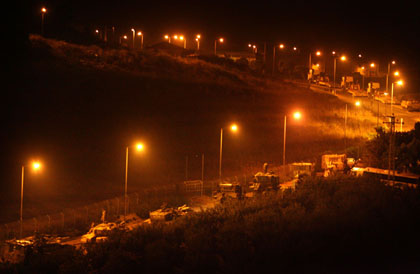New York -- A draft resolution circulating Saturday among UN Security Council
members would call for an immediate halt to fighting between Israel and
Hezbollah and seek a wide new buffer zone in south Lebanon monitored by
international forces and the Lebanese army.

Israeli
army vehicles are lined up before going into Lebanon north of Kiryat
Shmona, close to the Israel-Lebanon border, early morning July 30, 2006.
[Reuters] |
The proposal was sent quietly by France to the other 14 members of the
council ahead of a possible meeting of foreign ministers in New York to discuss
Lebanon sometime next week. A copy of the draft was obtained by The Associated
Press.
The proposal stresses the need "to create the conditions for a permanent
cease-fire and a lasting solution to the current crisis between Israel and
Lebanon."
Those conditions include a buffer zone stretching from the Blue Line, the
UN-demarcated boundary that Israel withdrew behind in 2000, to the Litani River,
which was the northern border of Israel's occupation of Lebanon in 1982.
The buffer zone would be "free of any armed personnel, assets and weapons
other than those of the Lebanese armed and security forces and of UN-mandated
international forces," the draft says.
The document, which is likely to see significant changes before adoption, is
the answer to the call made Friday by US President Bush and British Prime
Minister Tony Blair for a UN resolution that would lay the groundwork for peace
in Lebanon and deploy an international force there.
It starts by calling for an immediate halt to fighting that began almost
three weeks ago and has killed more than 500 people.
French diplomats refused to discuss the proposal, saying it had not been made
public yet. Benjamin Chang, a spokesman for the US Mission to the UN, said the
Americans had only just received the draft and were still studying it.
Still, the United States has so far refused to call for an immediate halt to
the hostilities, and may oppose any demands for that.
According to the resolution, other conditions for peace include the release
of the two Israeli soldiers whose abduction by Hezbollah sparked Israel's
devastating military campaign; and the implementation of Security Council
resolution 1559, which demanded Hezbollah be disarmed and Lebanon extend its
control to its southern border with Israel, where Hezbollah has de-facto
control.
Lebanon must also firm up its border "especially in those areas where the
border is disputed or uncertain, including in the Shebaa farms area," which sits
along the Israeli and Syrian border but is occupied by Israeli troops.
Once hostilities are stopped, the resolution would call on Lebanon to deploy
troops to the south along the Blue Line with Israel, and charge UN
Secretary-General Kofi Annan to work with "key regional and international
actors" to secure agreement from Lebanon and Israel for a lasting political
solution.
The current UN force in Lebanon, known by its acronym UNIFIL, would monitor
implementation of the resolution for now. But those troops would be replaced by
a more powerful international force to keep the peace.
The draft largely echoes ideas that France had circulated last week. But it
is the first time those ideas have been put into a draft resolution and suggest
a growing impetus toward action after three weeks in which the Security Council
has not responded to the Lebanon crisis.
According to the draft, the new peacekeeping force would be granted authority
under the powerful Chapter 7 of the UN Charter, which gives UN-backed troops a
broader mandate to respond to attacks.
Israel has said so far that it would not allow UN troops. Instead, it would
likely seek NATO forces, possibly operating under such a UN mandate.
Lastly, the resolution would ask the international community to give
financial and humanitarian support to Lebanon urgently.
Annan would have one week to report back to the council on the implementation
of the resolution.